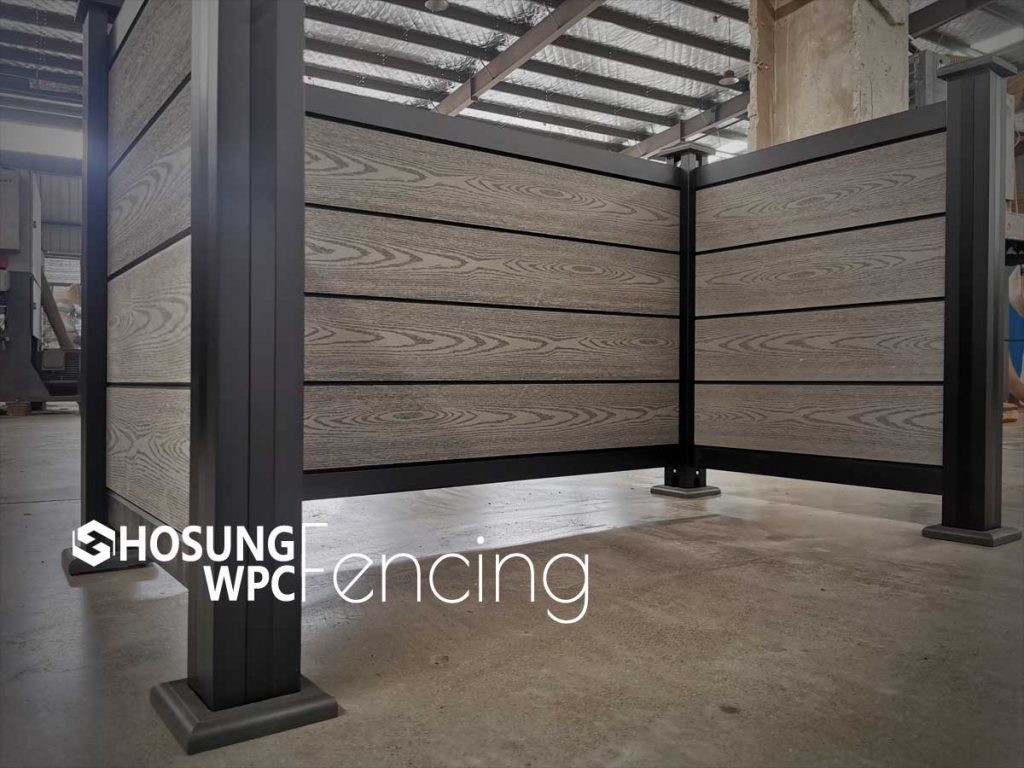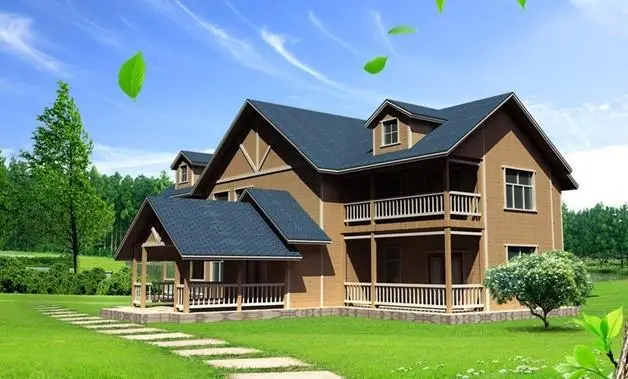In the world of contemporary outdoor design, modern composite decking has become the preferred choice for homeowners, architects, and landscape designers who seek durability, aesthetic appeal, and low-maintenance solutions. With cutting-edge manufacturing technologies and an ever-expanding palette of textures and colors, modern composite decking is reshaping how we view and experience outdoor spaces.
Table of Contents
In this article, we’ll dive deep into the trends, benefits, material technology, design ideas, and real-world applications of modern composite decking. Whether you’re planning to revamp your backyard, build a rooftop terrace, or add a statement deck to your vacation home, this comprehensive guide will help you make an informed decision.
What is Modern Composite Decking?
Modern composite decking refers to a new generation of wood-plastic composite (WPC) materials designed to replicate the look and feel of natural timber while offering superior performance. Unlike earlier versions of composite decking that often appeared artificial or plasticky, modern options incorporate 3D embossed textures, multi-tonal color layers, and UV-resistant capping that ensure longevity and realism.
These decking boards are engineered using a blend of recycled wood fibers and plastics, creating a dense, durable product that resists fading, staining, warping, and insect damage.
With modern deck composite decking, your outdoor space doesn’t just function better—it looks significantly more stylish and architectural.
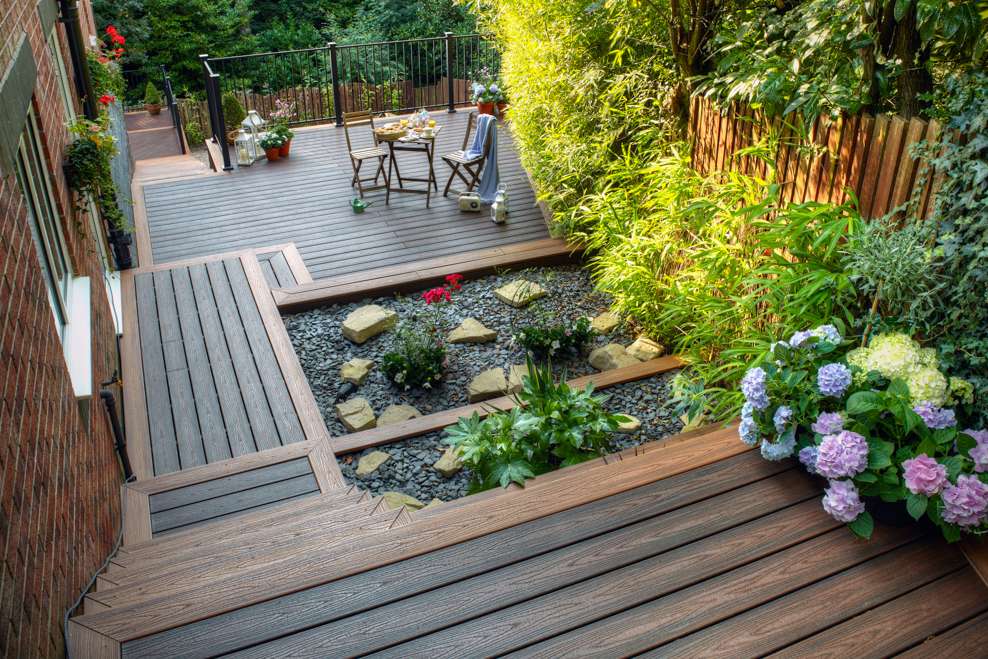
Advantages of Modern Composite Decking Over Traditional Wood
Choosing modern composite decking over traditional wood offers a multitude of benefits that go beyond aesthetics. From reduced maintenance demands to superior durability and environmental benefits, composite decking is engineered to provide long-lasting performance and design flexibility for today’s homeowners and outdoor architects.
2.1 Low Maintenance
Forget sanding, sealing, and annual staining. Composite decking requires only periodic washing with mild soap and water. It resists mold, mildew, rot, and insects naturally—meaning you spend more time enjoying your outdoor space and less time maintaining it. This is especially beneficial for busy households or vacation homes.
2.2 Durability
Modern decking boards are capped with UV-resistant polymers that protect against fading, surface wear, and moisture intrusion. This makes them ideal for extreme climates, including intense sun exposure, heavy rainfall, or freezing winters. Unlike traditional timber, composite boards won’t crack, split, or warp over time.
2.3 Aesthetic Versatility
Modern decking boards come in a wide variety of colors, textures, grain patterns, and finishes—from matte charcoal greys to rich espresso browns and warm natural oaks. Some boards even include variegated streaks for a more natural timber effect. This versatility allows you to match the decking to your home’s architecture, garden elements, or personal style, whether you prefer a coastal minimalist vibe or an urban industrial look.
2.4 Long-Term Value
Though the upfront cost may be higher than softwoods like pine or cedar, the long-term maintenance savings and longer lifespan (25–50 years depending on the brand) make modern composite decking a smart financial investment. There’s no need for annual sealing or replacing cracked boards, and many brands offer warranties up to 30 years.
2.5 Eco-Conscious
Most composite decking today, including premium options like modern view composite decking, is made with up to 95% recycled materials, including reclaimed wood fibers and post-consumer plastics. This not only reduces landfill waste but also helps conserve forests by lowering the demand for virgin lumber. For environmentally conscious consumers, this makes composite decking a sustainable and responsible choice.
Additionally, many manufacturers follow green manufacturing practices and offer certifications such as FSC® (Forest Stewardship Council) or LEED® credits, making it easier to align your outdoor project with sustainable building goals.
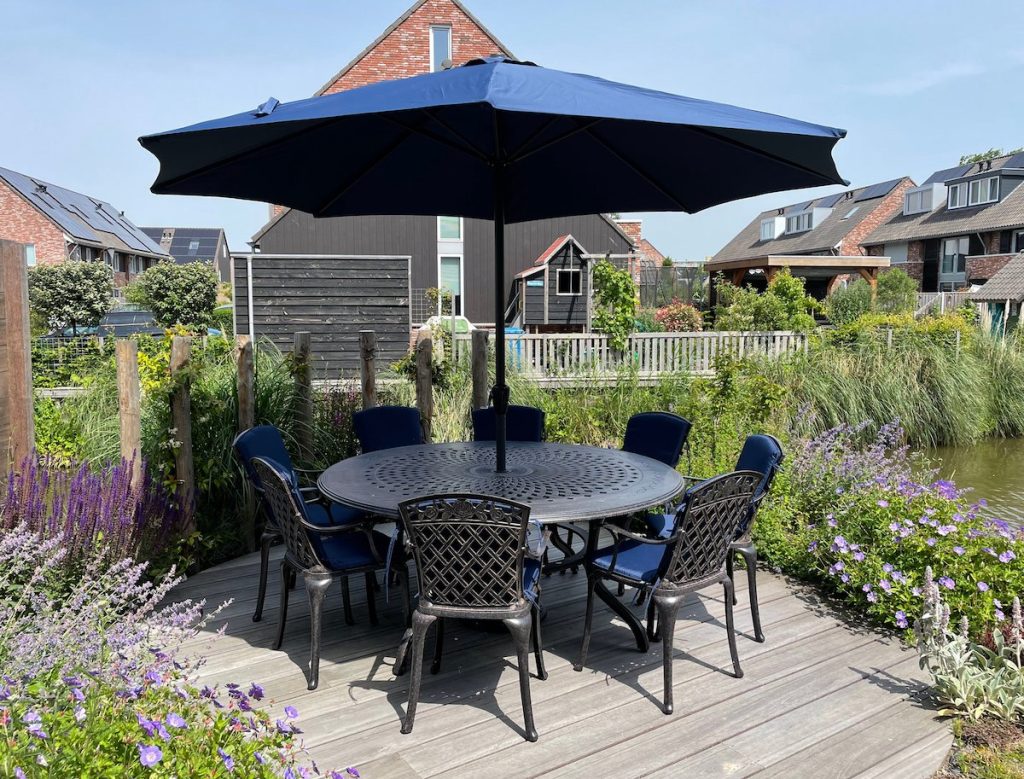
Popular Design Styles Using Modern Deck Composite Decking
Modern outdoor design has evolved far beyond basic square decks and traditional layouts. Thanks to the versatility of modern deck composite decking, today’s outdoor living areas are extensions of indoor spaces—featuring luxurious aesthetics, integrated lighting, sleek furniture, and functional zones. Composite materials offer the design flexibility needed to support everything from minimalist rooftop escapes to nature-blended backyard sanctuaries.
With the right color, board width, and layout orientation, modern composite decking can help shape a wide array of stylish outdoor environments that match your architectural vision and lifestyle needs.
Here are some of the most popular and trend-forward styles:
3.1 Minimalist Urban Terrace
Characterized by sleek, straight lines and muted colors such as graphite, slate, or ash. Frameless glass railings and low-profile furniture complete this rooftop or balcony design, offering uninterrupted skyline views and a clean, sophisticated look.
3.2 Scandinavian Outdoor Lounge
Inspired by Nordic design, this style blends light grey modern decking boards with natural wood furniture, woven accents, and neutral textiles. It emphasizes simplicity, natural light, and calming ambiance—ideal for relaxed gatherings or solo retreats.
3.3 Industrial-Inspired Patio
Utilizes composite decking modern boards in deeper tones—think espresso, iron, or weathered charcoal—paired with raw elements like black steel planters, exposed concrete, or corten steel decor. This look is bold, functional, and edgy, perfect for loft-style homes.
3.4 Nature-Integrated Retreat
A harmonious outdoor design that brings the serenity of nature to your doorstep. Use wide modern view composite decking in earth-inspired colors (bark, sand, moss) and pair them with stone walkways, natural water features, and lush plantings. Ideal for gardens and suburban backyards.
🔍 Comparison Table: Modern Deck Composite Decking Design Styles
| Style | Decking Color | Key Features | Ideal For |
|---|---|---|---|
| Minimalist Urban Terrace | Graphite, Ash Grey | Frameless glass, clean lines, rooftop use | Apartments, City Homes |
| Scandinavian Lounge | Light Grey, White Oak | Natural wood furniture, soft decor | Patios, Balconies, Nordic Homes |
| Industrial Patio | Dark Walnut, Charcoal | Matte black accents, steel & stone | Modern/Loft Homes |
| Nature Retreat | Earth Tones, Sandstone | Organic elements, greenery integration | Suburban Gardens, Retreat Areas |
Each of these designs benefits from the unique properties of modern composite decking, such as consistent coloration, moisture resistance, and customizable sizing. The result is not only a beautiful outdoor space but also one that is built to last, season after season.
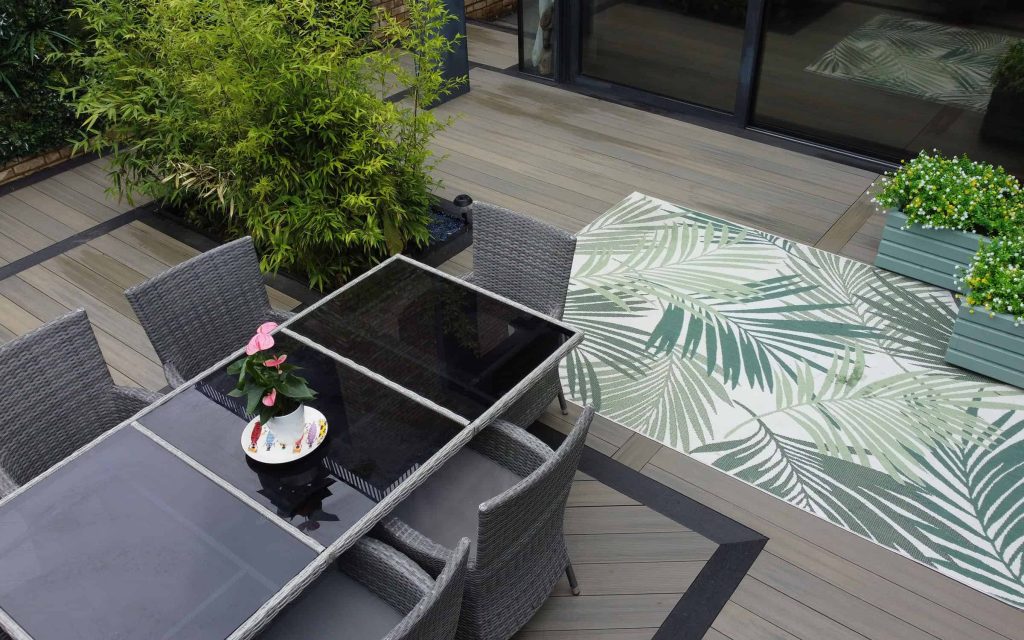
Key Features to Look for in Modern Decking Boards
When selecting decking materials, it’s important to evaluate:
4.1 Capping Technology
Opt for fully capped boards (4-sided protection) to ensure resistance to UV, moisture, and mold.
4.2 Texture
Choose embossed or hand-scraped textures to simulate real wood grain.
4.3 Board Profile
Hollow boards offer lighter weight and lower cost, while solid core boards provide greater strength.
4.4 Board Width
Wider boards (6–8 inches) are increasingly popular in modern view composite decking designs for cleaner, sleeker lines.
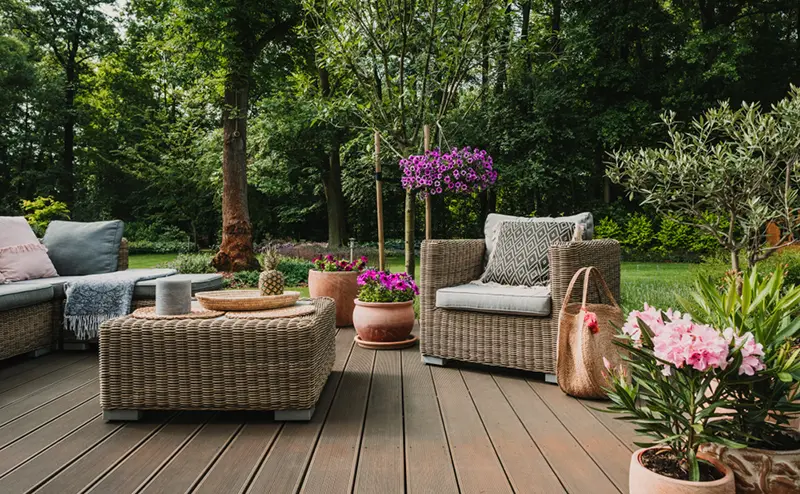
Comparison of Composite Decking: Modern vs Traditional
| Feature | Traditional Composite | Modern Composite Decking |
|---|---|---|
| Texture | Flat / smooth | 3D woodgrain embossed |
| Color Options | Limited | Wide, multi-tonal options |
| UV Resistance | Moderate | High with cap protection |
| Maintenance | Occasional scrubbing | Simple soap and water |
| Lifespan | 15–20 years | 25–50 years |
| Appearance | Artificial | Realistic wood-look |
| Eco-Friendliness | 70–80% recycled | Up to 95% recycled |
Modern innovations have made composite decking nearly indistinguishable from high-end hardwood, without the drawbacks.
Installation Tips and Best Practices
Whether DIY or professional, installation matters.
Pre-Planning: Account for board direction, spacing, and color variations.
Hidden Fasteners: These create a seamless, modern look.
Ventilation: Allow airflow under the deck to prevent mold buildup.
Tools: Use carbide-tipped blades for clean cuts.
Manufacturers often provide downloadable installation guides—always follow their specifications.
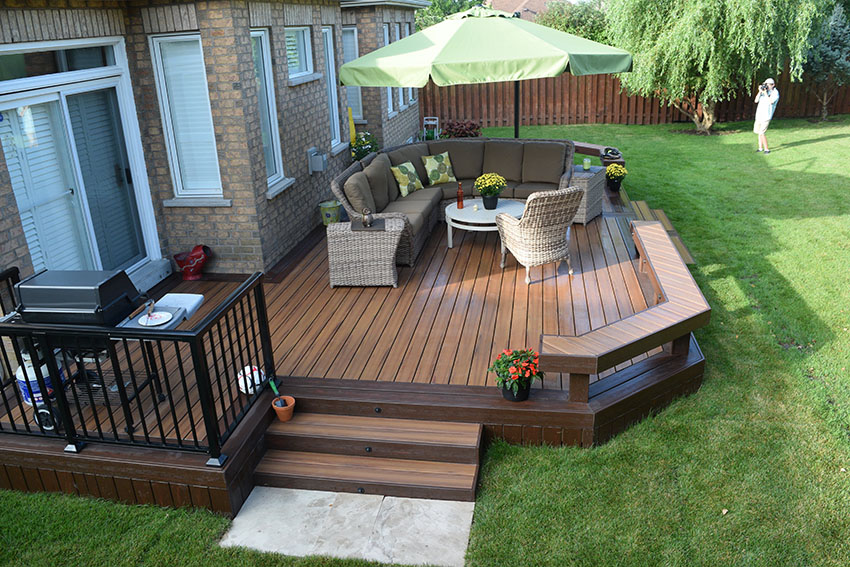
Sustainability and Eco-Friendly Options
With the growing emphasis on green building, modern composite decking fits perfectly into sustainable outdoor design.
Eco-Friendly Advantages:
Recycled content (wood and plastic)
No harmful chemical treatments
Long lifespan = less waste
Recyclable after use
Brands like Hosung, Trex, and Fiberon offer FSC-certified or LEED-compliant materials, ideal for environmentally conscious consumers.
Popular Brands and Product Recommendations
8.1 Hosung Composite Decking
Known for its advanced co-extrusion technology and embossed surface textures.
Offers premium lines such as 3D Woodgrain and Groove Edge Boards.
Factory-direct pricing makes it a strong alternative to higher-priced U.S. brands.
8.2 Trex Transcend
A household name in decking, offering 25+ year warranties and a range of colors.
8.3 TimberTech AZEK
High-performance PVC-capped composite ideal for luxury builds.
8.4 Fiberon Concordia
Offers both aesthetic appeal and sustainability.
If you’re looking for bulk or customized modern composite decking options, Hosung is an excellent OEM/ODM choice with global logistics capabilities.
Cost Overview and ROI
Here’s a breakdown of typical pricing (2025 estimates):
| Decking Type | Price per Sq. Ft. | Lifespan (Years) | Annualized Cost |
|---|---|---|---|
| Softwood (e.g. Pine) | $2.00 – $3.50 | 10–15 | ~$0.25/year |
| Hardwood (e.g. Ipe) | $6.00 – $9.00 | 20–25 | ~$0.30/year |
| Modern Composite | $4.50 – $8.00 | 25–50 | ~$0.16–$0.25/year |
Conclusion: Despite the higher upfront cost, modern composite decking offers superior ROI over time due to minimal maintenance and longer life.
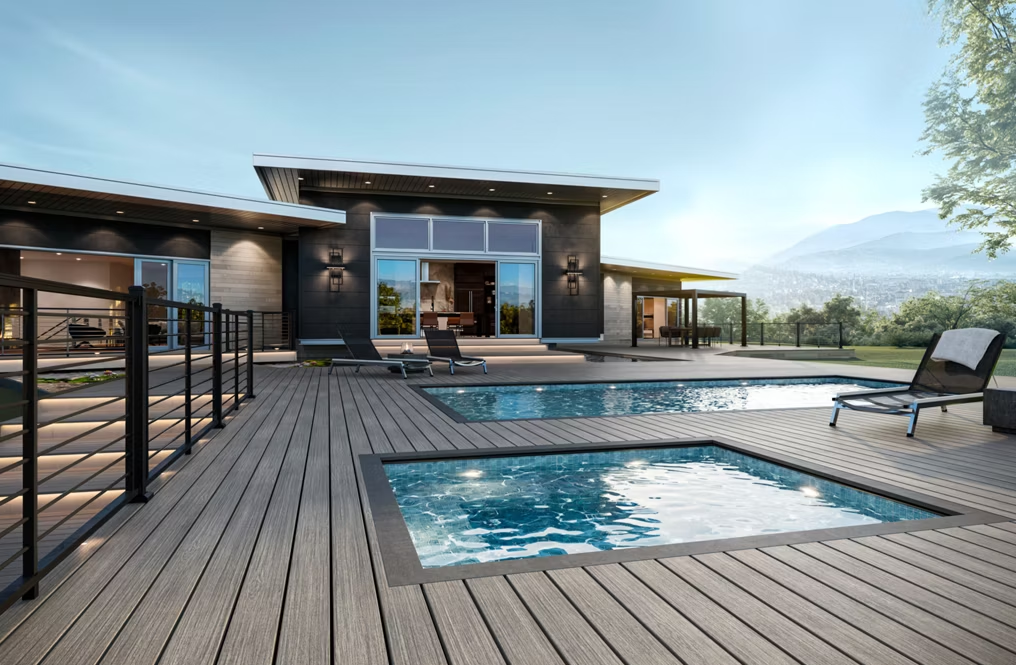
Final Thoughts: Is Modern Composite Decking Right for You?
Whether you’re a homeowner seeking a sophisticated patio upgrade or a contractor designing for modern clients, modern composite decking is an intelligent and stylish choice. Its combination of resilience, versatility, and eco-friendliness makes it the future of outdoor living.
From rooftop lounges to backyard escapes, composite decking modern technology has unlocked possibilities once limited by wood’s natural flaws. With trusted suppliers like Hosung, it’s now easier and more affordable than ever to bring your modern deck vision to life.
Frequently Asked Questions
Q1: Is modern composite decking slippery?
Most modern composite decking includes anti-slip textures, making them safe for wet areas like pools or docks.
Q2: Can I install modern decking boards over an existing wooden deck?
Yes, but only if the underlying substructure is stable and free of rot.
Q3: Do composite decking boards fade?
With capped technology, fading is minimal even after years of sun exposure.
Q4: What are some unique design ideas using modern view composite decking?
Incorporate diagonal patterns, LED strip lighting, and planters with matching skirting for a seamless look.

